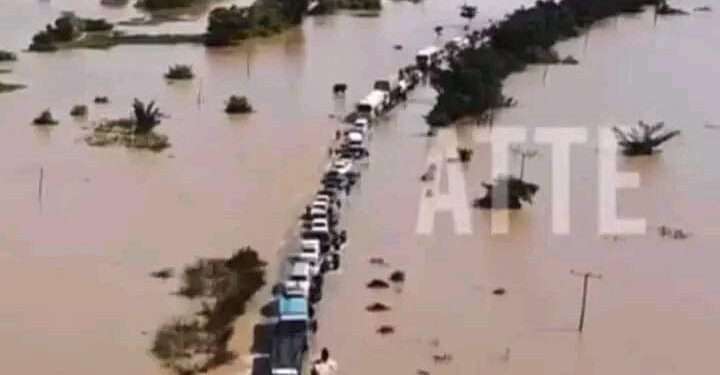The Hidden Wealth In Lokoja Floods - Business - Nairaland
Nairaland Forum / Nairaland / General / Business / The Hidden Wealth In Lokoja Floods (353 Views)
Naira Devaluation Wipes Off $3 Billion From Dangote's Wealth In One Week / The Hidden Wealth: Sim Card Registration Business / Hidden Wealth Academy Presents Wealth Creation Channels (2.0) (2) (3) (4)
| The Hidden Wealth In Lokoja Floods by Newphil: 8:10pm On Oct 06, 2022 |
We usually think about flooding in negative terms, but we need to first address the TYPE of flooding we are dealing with. One day I was passing through Lokoja and had time to do a simple evaluation of the topography in view of its perennial flooding. The first thing that struck me was the mind-boggling agricultural potential of that town and the great asset the flood is. Lokoja flooding is a positive type, an equivalent of what is called a loess in the climatology of an arid environment. The flooding in Lokoja results from the annual swelling of two major rivers. In agricultural resources management, this is pure gold and such areas are given social attention with a view to enhancing agricultural productivity. Floods that result from annual overflow (or swelling) of rivers are a strong ecosystem factor and if you subject the phenomenon to detailed biological studies, you will find that a lot of the plants and animals on micro and macro levels have their calendars latched to that annual event. The marine lives will spawn at a period based on the flood and even trees there could use it to time their seed dispersal. But the major and primary factor here is that the overflow of the rivers brings huge amounts of minerals onto land and this vastly improves agricultural yield. This is the reason I advocated two days ago that whatever needs to be done to rein in those floods must make saving those flat, flooded lands a priority. The floods must be allowed there yearly, not banished altogether. If you kill the floods completely, you will be killing the town itself and all the areas that rely for food and trade on its agricultural produce. In desert climatology, winds often transport fine aggregates of soil over great distances to deposit them over an area. (I am not talking about standard desert dunes but fine dust - the type you see in Harmattan season here). This is called loess and it is an agricultural blessing due to its fertility. Deposits from river flooding have an even bigger effect. The floods are rich in organic and mineral materials that stimulate agriculture in the next season. So, we need to understand that this is a definition ecological phenomenon that has stabilized over millions of years and that is critical for the environment in that location and even further downstream. It should be managed and not destroyed. This should be the starting position of planners as efforts are being conceived to control these floods. I said earlier that the floods in Lokoja are the good type of floods. Which are the bad types? Urban floods due to blockage of drains, floods from unusual high tide with the ocean encroaching - like it used to be on Victoria Island in Lagos, flash floods resulting from wayward precipitation are bad floods. The worst are those from typhoons and hurricanes. That's just sea water pretending to be rain, being dumped on land. Those only pollute and destroy. As you approach Lokoja from the north, a vast flatland greets you to your right. Homes dot this landscape - homes that should not be there. The whole place looks like Iowa, with fields stretching out everlastingly to meet the dome of the sky or kiss hills far away to the south A nation like Italy spent billions (of their Marshall Plans funds) to achieve this type of agricultural land by laser-leveling their land. Level lands help you plan your drainage systems effectively and at lower costs. Benito Mussolini (Yes, the same one) did something even more agriculturally strategic earlier on by stabilizing flooded lands in the central areas of the country. I was once briefed on this and I believe the planners on Lokoja should visit Italy and study Mussolini's reclamation works. It is applicable to the situation in Lokoja, in my opinion. Flatlands are great for lowland rice cultivation and for aquaculture like shrimping, we take fisheries for granted. Planned industrial agriculture in that zone can unlock the wealth hidden in it from creation by the dynamics of nature we are exploring. It is important that the authorities start out viewing Lokoja floods' hidden advantage before doing anything. A comprehensive study of the ecology of the area is necessary and if done right, that city can become the national asset and confluence of opportunities and wealth that it is. https://www.naijabusiness.com.ng/featured/2022/the-hidden-wealth-in-lokoja-floods/  1 Like |
| Re: The Hidden Wealth In Lokoja Floods by Veryfied: 10:28pm On Oct 06, 2022 |
Cc seun this article is great bit should be presented in a more suitable fashion to the layman so our Agricultural sector should benefit from this exposé. |
| Re: The Hidden Wealth In Lokoja Floods by Realdeals(m): 8:01am On Oct 07, 2022 |
Insightful analysis, that deserve every attention. Cc: Mynd44, lalasticlala |
(1) (Reply)
Don't Be A Victim Of This Unknown Bank Mistake. / Help A Man With An Online Business / PR Firms In South Florida
(Go Up)
| Sections: politics (1) business autos (1) jobs (1) career education (1) romance computers phones travel sports fashion health religion celebs tv-movies music-radio literature webmasters programming techmarket Links: (1) (2) (3) (4) (5) (6) (7) (8) (9) (10) Nairaland - Copyright © 2005 - 2024 Oluwaseun Osewa. All rights reserved. See How To Advertise. 19 |